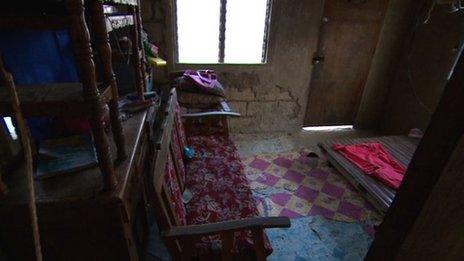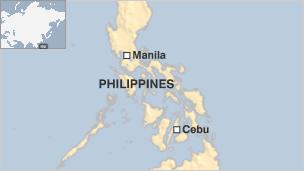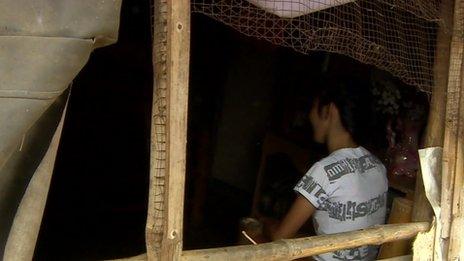UK paedophiles pay to watch webcam child sex abuse in Philippines
- Published
The "cybersex den" in Ibabao where abuse is said to have happened
British paedophiles are paying to watch the abuse of children in the Philippines via webcams, a BBC investigation has found.
In one case, a British man organised the sexual abuse of five children from the same family.
Charities believe tens of thousands of children are victims of the trade.
On Thursday, Britain's National Crime Agency will reveal how it is working with the American, Australian and Philippine police to target abusers.
A BBC team travelled to the slum of Ibabao, near Cebu City in the south of the country.
'Easy money'
Local charities call it the "epicentre" of the trade.
For our own safety, we had a police escort; one of the officers carried an assault rifle.
Officer Denis Comunay, who regularly patrols the slum, said: "You can get easy money from the cybersex."
He showed us a small house, with a corrugated iron roof.
It was almost empty inside apart from a dirty mattress on the floor and electric sockets hanging from the ceiling.
Angus Crawford visits a refuge for victims of cybersex abuse in the city of Cebu
It was what he calls a cybersex den.
"Fathers and mothers would bring their children here to show, and would get paid by the owner of the house," he said.
He explained the property owner forced her own children to "perform" for foreigners using a webcam.
Other people in the community who heard there was money to be made then brought their children too.
At a house nearby there were family photos on the walls, washing still hanging on the line, but it was deserted.
It too was raided by police - a child of two was taken into care.
Public morality
All of the neighbours said they were shocked to hear about the cases but denied they knew what was going on.

A number of children were rescued after the arrest of Briton Timothy Ford
One said: "How can I know when the house is closed and I did not get inside and see what they are doing?"
But a recent survey indicated that 80 houses in the area were involved in the trade.
Noemi Truya-Abarientos, who works for the Children's Legal Bureau aiming to provide judicial help for abuse victims, said: "It has become a cottage industry."
She blamed poverty and a breakdown in public morality for the rise in the trade, explaining that local businessmen rented out laptops and USB internet connections, so it was easy for families to start.
Parents use internet chatrooms to find "clients" and receive payment through international money transfers.
They justify what they do by claiming that foreign paedophiles do not actually touch the children.
Noemi said this was a myth. "The client gives the instruction to touch this and touch that.
"They even send sex toys to these children."
In Angeles City in the north of the country there were two houses in a slum area raided in 2012 by police from the UK, the Philippines, Australia and the US, showing that law enforcement around the world is starting to tackle the problem.

The abuse took place in slum areas
One neighbour said: "They arrest this person and put them in a van and they take the children away."
Twelve children aged between five and 15 were rescued and several of their relatives were arrested.
'Growing demand'
The operation followed the arrest of British man Timothy Ford, from Kettering, in Northamptonshire, the same year. He is now serving an eight-and-a-half year sentence in a UK prison.

When detectives analysed his laptop, they found obscene images and records of money transfers to the parents - he had paid to watch the abuse of five of the children.
He paid as little as £13 to watch what he called "a show".
Officers found he planned to buy property in the area and set up an internet cafe.
Father Shay Cullen, who runs the Preda Foundation - a charity that rescues victims in the nearby city of Olongapo - said: "More and more parents are pushing their children to get involved in this, to make big money.
"There's a huge growing demand and there's a growing supply."
The Philippine government estimates that between 60,000 and 100,000 children are victims of sexual exploitation, many of them in cybersex.
While some children are forced to take part by their own family, others are made to work in cybersex dens by pimps.
This is what happened to Lani when she was 15. "The cybersex den is an evil kind of profession," she told us.
Her aunt promised her a job as a nanny, but when she got to the house she was told she had to "chat" to foreigners.
The "chat" soon turned into demands for her to take off her clothes and "perform" for the men watching on the webcam.

Lani was forced to perform on webcams aged 15
"Perhaps when people hear about cybersex they think it doesn't have any physical effect," she said.
"But it can do things to your core. It can take things from you, your dignity and your purity."
Father Cullen warns that men in the West who pay to watch abuse in poor countries may go on to commit other offences.
"It's the warm-up for a sexual assault on a child," he said.
"And next time it's going to be a child in the UK."
- Published5 November 2013
- Published9 October 2012
- Published3 March 2011